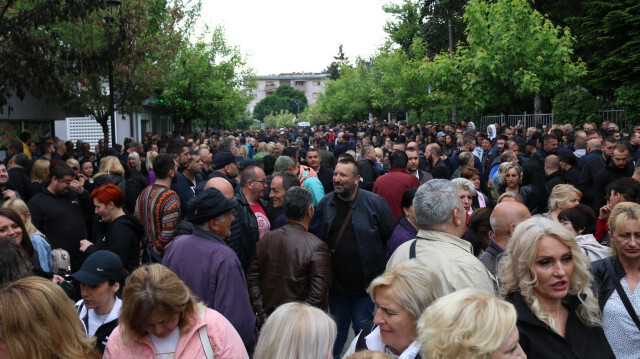Why have Kosovo-Serbia tensions flared up again?

Tensions between Serbia and Kosovo have soared once again since last weekend, this time as the aftermath of local elections that were boycotted by the Serb majority in northern Kosovo.
There have been violent clashes in Kosovo, with police and NATO-led peacekeepers facing off with local Serbs.
Dozens of people on both sides have been wounded in the violence, sparking calls for restraint and calm from around the world.
Serbia has ordered its army to be combat ready and advance to the border with Kosovo, spurring fears of an all-out conflict based on the region’s deep ethnic divisions.
- What is the history of the Serbia-Kosovo dispute?
Kosovo was a part of Serbia before it declared independence in 2008.
It is aligned with the West and its independence has been recognized by some 100 countries, including the US and Türkiye.
On the other hand, Serbia, despite its ambitions to join the EU and be part of the European political landscape, has historically close ties to the East. Russia and China back Serbia and have supported it in not recognizing Kosovo’s independence.
Kosovo having an Albanian-majority population was a driving force behind its separation.
The 1998-1999 Kosovo War was a deadly conflict that claimed thousands of lives and destabilized the region, while the area that is Kosovo today was ruled by an international administration for a decade before it broke away from Serbia.
Serbia, despite not having any actual power over the region, continues to claim sovereignty over Kosovo, laying the ground for a dispute that keeps the region – and the world – on edge.
History, religion, and ethnicity all have a pivotal role in the conflict.
Kosovo is utterly important for Serbia, a nation that traditionally takes pride in its religion, due to the presence of numerous Serb Orthodox churches and monasteries in the breakaway state, all of which date back centuries.
On the other hand, ethnic Albanians living in Kosovo accuse Serbia of repression and claim the land as their own.
When Serbia launched a brutal campaign against Albanian revolts in 1998, NATO intervened and the area was placed under the control of international peacekeepers, which paved the way for Kosovo’s eventual independence in 2008.
- What caused the latest flare-up?
The seeds were sown last month when Serbs boycotted local government elections for four municipalities in Kosovo’s north, areas where Serbs make up a majority of the population.
The turnout was less than 4%, according to official counts, but the poll victories for ethnic Albanian mayors still counted.
Things came to a head when the newly elected mayors were due to move into their offices last Friday.
Serb protesters gathered outside the buildings to block the mayors from entering, triggering standoffs that saw riot police fire tear gas.
Matters escalated on Monday as Serbs clashed with local police and NATO peacekeepers. Dozens of protesters and peacekeepers were injured in the fierce violence, drawing international attention and stoking fears of escalating conflict.
Over the weekend, Serbia ordered its army to be combat ready and advance to the border with Kosovo.
- What has the international community said?
There has been condemnation and calls for calm from all corners of the world.
The US, EU, NATO, Türkiye, France, Germany and other powers have all expressed concern and urged for an immediate halt to hostilities.
NATO has also said it will send hundreds of more additional troops to Kosovo.
Russia has warned that the escalation could provoke another conflict in Europe, while China has put its weight behind Serbia, saying it supports Belgrade’s “efforts to safeguard its sovereignty and territorial integrity.”
- What is being done to resolve the conflict?
There have been several past attempts by international players for peace in the region.
Nevertheless, with both countries led by nationalist governments that show little willingness to compromise, peace remains an unlikely prospect at the moment.
Kosovo’s Prime Minister Albin Kurti backs the unification of his country with Albania and rejects any compromise, while Serbian President Aleksandar Vucic insists his country will not budge unless Kosovo compromises.
The EU could play a critical role since both Serbia and Kosovo want to join the bloc, something that can only happen once they normalize relations.
The promise of EU membership could be a powerful incentive to bring the two sides to an agreement, but how that actually plays out remains to be seen.
Reklam yükleniyor...
Reklam yükleniyor...







Comments you share on our site are a valuable resource for other users. Please be respectful of different opinions and other users. Avoid using rude, aggressive, derogatory, or discriminatory language.